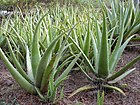Note: This is a project under development. The articles on this wiki are just being initiated and broadly incomplete. You can Help creating new pages.
Aloe vera - Ghritakumari
Aloe vera is a plant species of the genus Aloe. It grows wild in tropical climates around the world and is cultivated for agricultural and medicinal uses. Aloe is also used for decorative purposes and grows successfully indoors as a potted plant.
Contents
- 1 Uses
- 2 Parts Used
- 3 Chemical Composition
- 4 Common names
- 5 Properties
- 6 Habit
- 7 Identification
- 8 List of Ayurvedic medicine in which the herb is used
- 9 Where to get the saplings
- 10 Mode of Propagation
- 11 How to plant/cultivate
- 12 Commonly seen growing in areas
- 13 Photo Gallery
- 14 References
- 15 External Links
Uses
asthma,, stomach ulcers, depression,, diabetes, Skin eruptions, Blotches, Pimples, inflamed skin, InDigestion
Parts Used
Chemical Composition
Aloe vera include: amino acids, anthraquinones, enzymes, minerals, vitamins, lignins, monosaccharide, polysaccharides, salicylic acid, saponins, and sterols.[1]
Common names
| Language | Common name |
|---|---|
| Kannada | lolesara |
| Hindi | Gheekuvar |
| Malayalam | Chotthu kathalai |
| Tamil | Kathalai |
| Telugu | |
| Marathi | NA |
| Gujarathi | NA |
| Punjabi | NA |
| Kashmiri | NA |
| Sanskrit | |
| English | Indian Aloe |
Properties
Reference: Dravya - Substance, Rasa - Taste, Guna - Qualities, Veerya - Potency, Vipaka - Post-digesion effect, Karma - Pharmacological activity, Prabhava - Therepeutics.
Dravya
Rasa
Guna
Veerya
Vipaka
Karma
Prabhava
Habit
Identification
Leaf
| Kind | Shape | Feature |
|---|---|---|
| Simple | triangular | The tissue in the center of the aloe-veraAloe leaf contains a gel which yields the aloe gel |
Flower
| Type | Size | Color and composition | Stamen | More information |
|---|---|---|---|---|
| Unisexual | 2-4cm long | Yellow | 5-20 | Flowers Season is June - August |
Fruit
| Type | Size | Mass | Appearance | Seeds | More information |
|---|---|---|---|---|---|
| triangular | 7–10 mm | The fruit is the triangular capsule containing numerous seeds | many | {{{6}}} |
Other features
List of Ayurvedic medicine in which the herb is used
- Vishatinduka Taila as root juice extract
Where to get the saplings
Mode of Propagation
How to plant/cultivate
It is a perennial plant, growing to the hight of 1½ - 2½ ft. Its leaves are long and thick, juicy with a wheel like phylotaxy. The two sides of the leaves have thorny structure with a thorny tip[3]
Commonly seen growing in areas
Tall grasslands, meadows, Borders of forests and fields.
Photo Gallery
References
External Links
- Ayurvedic Herbs known to be helpful to treat asthma,
- Ayurvedic Herbs known to be helpful to treat stomach ulcers
- Ayurvedic Herbs known to be helpful to treat depression,
- Ayurvedic Herbs known to be helpful to treat diabetes
- Ayurvedic Herbs known to be helpful to treat Skin eruptions
- Ayurvedic Herbs known to be helpful to treat Blotches
- Ayurvedic Herbs known to be helpful to treat Pimples
- Ayurvedic Herbs known to be helpful to treat inflamed skin
- Ayurvedic Herbs known to be helpful to treat InDigestion
- Herbs with Leaves used in medicine
- Herbs with common name in Kannada
- Herbs with common name in Hindi
- Herbs with common name in Malayalam
- Herbs with common name in Tamil
- Herbs with common name in English
- Habit - Herb
- Index of Plants which can be propagated by Seeds
- Index of Plants which can be propagated by Cuttings
- Herbs that are commonly seen in the region of Tall grasslands
- Herbs that are commonly seen in the region of meadows
- Herbs that are commonly seen in the region of Borders of forests and fields
- Herbs






